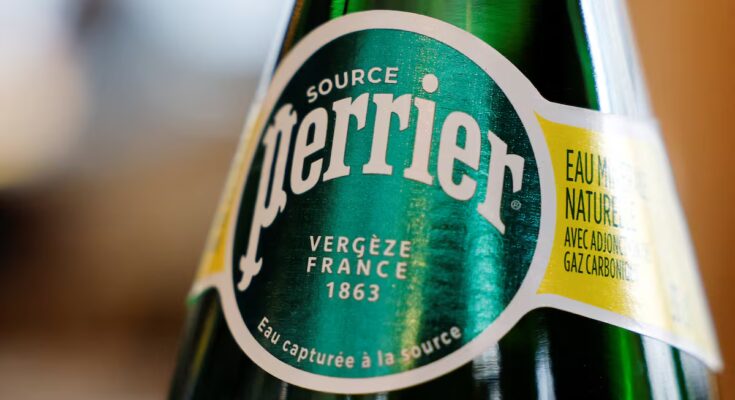This Tuesday was a key day for the future of France’s most famous bottled water brand, Perrier. A court had to decide whether to ban its sale and remove the “natural mineral water” label, as requested by a consumer organisation, which filed a complaint after it was revealed that purportedly “pure” water had been marketed, but which had previously been treated to prevent contamination, which the law does not allow.
On Tuesday the court rejected these arguments and ruled in favor of Nestlé Waters, the Swiss group that owns Perrier. It may continue to be sold under the “natural mineral” label, despite suspicions. This name is strictly regulated by the EU. This type of bottled water cannot be subjected to disinfection processes or processes that modify its characteristics.
“According to the evidence, the existence of a risk to the health of consumers linked to Perrier waters labeled as ‘mineral’ has not been demonstrated. It has not been possible to demonstrate that there is imminent harm,” the court in Nanterre, on the outskirts of Paris, said in its decision.
Perrier’s famous green bottles have been produced for 160 years at the Vergèze factory in the Gard department of southern France. This industry is the economic engine of this municipality of just 5,000 inhabitants, still awaiting the court ruling. Nestlé Waters also produces Vittel or Contrex branded bottled waters at its Vosges plant in northern France. Both factories have belonged to the group since 1992.
The Court’s decision is a relief for Nestlé, at the center of a scandal that dates back to early 2024, when the media Le Monde and France Info revealed that it had used water purification treatments (ultraviolet, activated carbon or microfiltration) to combat bacterial contamination. In theory, water labeled as “natural mineral” should not pass through any filter.
The group has defended itself by arguing that it no longer uses these systems, but rather another microfiltration process that does not alter the composition of the water and which was validated by the government in 2023. The issue has touched the Executive, as a commission of inquiry commissioned by the Senate earlier this year concluded that it was aware of, but concealed or ignored the use of these illegal treatments by Nestlé Waters.
Health authorities have ordered inspections of the group’s wells and reported that the microfiltration system Nestlé claims to use changes the composition of the water. The Swiss group replaced it with another and asked permission from the Gard prefecture (the government delegation) to be able to bottle in the Vergèze plant, the Perrier factory. He hasn’t received a response yet.
What has been called into question in this case is whether there is a risk to public health. The group has always maintained that consumer safety has never been compromised, but the UFC-Que Choisir association estimated in its complaint that a risk existed, since water had been put on sale that had some type of contamination at the source, although filtered.
We remind you that in recent years, especially after periods of heavy rain, health authorities have detected bacteria of faecal origin in the wells used by Perrier in its checks. In 2004, two million containers had to be destroyed due to the presence of fecal batteries in one of its wells. Nestlé says it did this as a precaution and that necessary measures will be taken as soon as any anomaly is detected.
The industry criticized the court’s decision. According to the spokesperson of the union that brings together natural mineral water brands (MENM, in French), “it is a disappointment”. “The Senate committee revealed real problems with regulation. It was difficult to think that (the court) would not take measures to protect consumers,” says David Merle, a member of the union and also the founder of one of the mineral water brands (Bonneval).
Nestlé wins a first battle in the filtered mineral water scandal, but still has some left, given that the prefect of Gard, where the historic Perrier factory is located, has yet to decide whether to allow the exploitation of its wells and use filtering systems, despite the water being bottled as pure.



